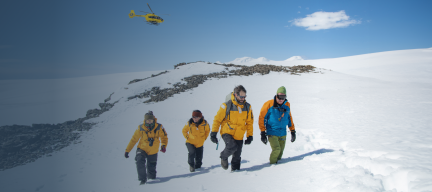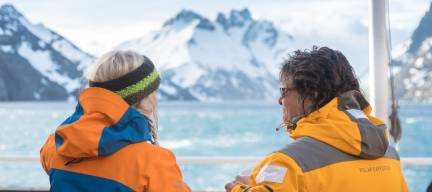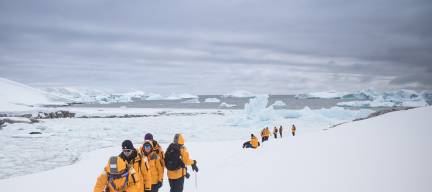We often hear of Antarctic cruises being referred to as once in a lifetime trips. It’s a bucket list destination: an experience you have to have at some point in your life.
Yet many passengers travel to Antarctica over and over – some dozens of times. It’s not difficult to fall in love with the pristine icescapes and remote, rugged adventure of the Antarctic regions. But one of Antarctica’s greatest draws is that no two trips to the area are ever the same; in fact, visiting its diverse regions at different points in the austral summer offers entirely new and unique experiences each time.
Antarctic weather, wildlife activity, icebergs, Adventure Options and more vary throughout the polar cruise season. What can you expect from early, mid- or late-season visits?

Why Visit Antarctica in the Early Season
Early season is great for Antarctic adventures like hiking, camping, stand-up paddleboarding and kayaking. Penguins and seabirds are just coming into their mating season – it’s an ideal time to see energetic penguins participating in their courtship rituals and beginning to nest.
Our Antarctic cruise season kicks off with the Antarctic Explorer: Discovering the 7th Continent voyage in early November, when the landscape is crystal clear and white. Pack ice is starting to melt, making navigation of the waters around the Antarctic Peninsula more manageable. Landing sites are perfectly untouched, with crisp snow and ice, sharp and well-defined icebergs, and spectacular vistas.
On South Georgia, massive southern elephant seals come ashore to molt, entertaining beach visitors with their incredible roars.
Early season offers great savings as the precursor to the mid-season travel period. Rates are traditionally lower than for mid-season, and early booking bonuses can help more budget-conscious travelers save even more on these maximum-value, shoulder-season trips.

Image credit Sam Crimmin
What to Expect of Mid-Season Antarctic Weather
Late December and January offer up to 20 hours of sunlight in Antarctica, making this one of the most popular times to travel. As temperatures rise, icebergs, bergy bits and growlers begin to melt, changing in shape and hue, creating striking natural art for passengers to enjoy.
Penguins begin hatching, first in the Falkland Islands (Sea Lion Island and Bleaker Island are perfect places to see multiple species of penguins playing), then farther south on the Antarctic Peninsula. Extensive daylight hours offer fantastic natural lighting for wildlife and landscape photography.
From the Falklands to South Georgia to Antarctica, wildlife is the most active this time of year. Gentoo chicks hatch January or February, making mid-season the best time to spot them either nesting or tending their young. Majestic humpback whales and playful orcas delight visitors from just offshore. During this time period, passengers cruising in Zodiacs at Wilhelmina Bay recently spotted 50 whales parading for the cameras!
At this time of year, an Antarctic Express: Fly the Drake expedition can have you enjoying the rugged peaks of the peninsula’s mountains and engaging gregarious Adélie penguins on ice beaches in as little as 8 days total trip time!

Why Travel to Antarctica in Late Summer Season
In February and March, travelers can access regions farther south, as pack ice continues to recede. Snow algae is in full bloom, and as days become shorter again, sunsets are stunning.
Stepping onto the deck of the Island Sky on an all-inclusive vacation, you might hear the crack and thunderous boom of a massive glacier calving as the relatively warm late-season Antarctica weather takes its toll.
Penguins and seals entertain on the Antarctic Peninsula during the late season. On our popular February South Georgia and Antarctic Peninsula: Penguin Safari expedition, you’ll find South Georgia and Antarctic beaches teeming with wildlife. Some South Georgian rookeries number in the hundreds of thousands, and this late in the season they’re incredibly active and full of energetic new additions to the pack.

Deciding When to Visit Antarctica
Antarctica and surrounding southern Polar Regions offer extremely unique experiences for each visitor. Be prepared for anything! And increase the likelihood of seeing what interests you the most by traveling at the time of year your desired activities and experiences are most likely.
Join the Quark Expeditions® community to explore photos, videos and commentary from other passengers, and then contact an experienced Polar Travel Adviser to learn more about when to travel to Antarctica.









